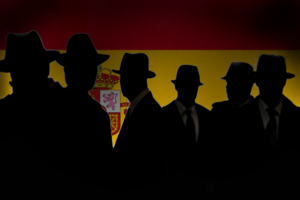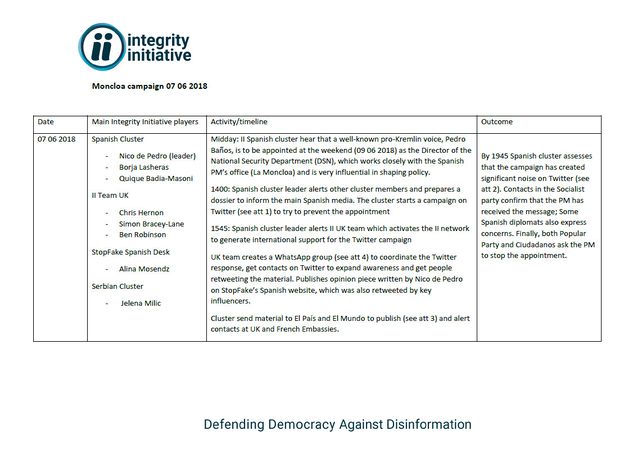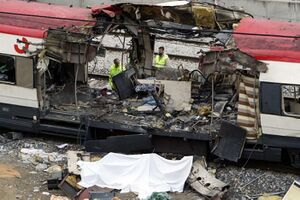Difference between revisions of "Spain/Deep state"
m (Marquesses of Urquijo) |
(reference) |
||
| (One intermediate revision by the same user not shown) | |||
| Line 8: | Line 8: | ||
|description=The Spanish deep state | |description=The Spanish deep state | ||
}} | }} | ||
| − | '''The [[Spanish]] [[deep state]]''' of today can be understood as a continuation of the regime of [[Francisco Franco]]. It is class based in the bourgeoisie, the victors in the civil war 1936-39. After the democratization 1975-81, the civil service was never really reformed. The police, the army and the business leaders consisted of the same people. The new generation journalists and editors (see [[Juan Luis Cebrián]]) and right wing politicians (see [[José María Aznar]]) were the sons and daughters of important people in the old regime, shedding the outward fascism, but never being in doubt of who should rule the state. | + | '''The [[Spanish]] [[deep state]]''' of today can be understood as a continuation of the regime of [[Francisco Franco]]. It is class based in the bourgeoisie, the victors in the civil war 1936-39. After the democratization 1975-81, the civil service was never really reformed. The police, the army and the business leaders consisted of the same people. The new generation journalists and editors (see [[Juan Luis Cebrián]]) and right wing politicians (see [[José María Aznar]]) were the sons and daughters of important people in the old regime, shedding the outward fascism, but never being in doubt of who should rule the state.<ref>https://jacobin.com/2020/06/francisco-franco-spain-monuments-fascism</ref> |
== 20th century == | == 20th century == | ||
=== WW2 - Fascist haven === | === WW2 - Fascist haven === | ||
| − | During the [[Cold War]], Spain was a hub and safe haven for fascist and nazi networks, including [[Operation Gladio]]. Former SS general [[Otto Skorzeny]] ran some of these connections from his asylum in Spain. | + | During the [[Cold War]], Spain was a hub and safe haven for fascist and nazi networks, including [[Operation Gladio]]. Former [[SS]] general [[Otto Skorzeny]] ran some of these connections from his asylum in Spain. |
These networks collaborated with the [[CIA]] in the fight against Communism. Italian fascist, after the failed [[Borghese Coup]] sought refuge in Spain. Some, such as [[Stefano delle Chiaie]] moved on with the help of the CIA to [[South America]], where they were employed by the intelligence agencies.<ref>https://midtifleisen.wordpress.com/2019/09/12/stefano-delle-chiaie-godfather-of-fascist-terrorism-and-cia-asset-dead-at-age-82/</ref> | These networks collaborated with the [[CIA]] in the fight against Communism. Italian fascist, after the failed [[Borghese Coup]] sought refuge in Spain. Some, such as [[Stefano delle Chiaie]] moved on with the help of the CIA to [[South America]], where they were employed by the intelligence agencies.<ref>https://midtifleisen.wordpress.com/2019/09/12/stefano-delle-chiaie-godfather-of-fascist-terrorism-and-cia-asset-dead-at-age-82/</ref> | ||
| Line 25: | Line 25: | ||
=== 1980s === | === 1980s === | ||
The Spanish nobles and bankers María Lourdes de Urquijo, 5th Marchioness of Urquijo and Grandee of Spain, and her husband Manuel de la Sierra, [[Assassination of the Marquesses of Urquijo|were murdered in their Madrid home on 1 August 1980]]. | The Spanish nobles and bankers María Lourdes de Urquijo, 5th Marchioness of Urquijo and Grandee of Spain, and her husband Manuel de la Sierra, [[Assassination of the Marquesses of Urquijo|were murdered in their Madrid home on 1 August 1980]]. | ||
| + | |||
| + | The province of [[Galicia]] is the main entry point for point for [[Colombian]] [[cocaine]] and [[Moroccan]] hashish]] into [[Europe]]. | ||
=== 1990s === | === 1990s === | ||
| − | |||
== 21st century == | == 21st century == | ||
=== 2000s === | === 2000s === | ||
| Line 51: | Line 52: | ||
==People== | ==People== | ||
| + | * The banker [[Juan March]], labeled "the last pirate of the Mediterranean". Closely associated with the Nationalist side during and after the [[Spanish Civil War]], and with a covert collaboration with the British, March was the wealthiest man in Spain and the sixth richest in the world by the time of his death in 1962. | ||
* [[Juan Luis Cebrián]] - Media mogul, [[Bilderberg steering committee]], has attended more Bilderbergs than any other Spaniard | * [[Juan Luis Cebrián]] - Media mogul, [[Bilderberg steering committee]], has attended more Bilderbergs than any other Spaniard | ||
* [[Jaime Carvajal Urquijo]] - Another Spanish Bilderberg steering committee member | * [[Jaime Carvajal Urquijo]] - Another Spanish Bilderberg steering committee member | ||
* [[Matías Rodríguez Inciarte]] - 13 Bilderbergs, former Bilderberg steering committee member | * [[Matías Rodríguez Inciarte]] - 13 Bilderbergs, former Bilderberg steering committee member | ||
| + | *[[Carlos March Delgado]] Spanish banker. | ||
* [[Spanish Bilderbergers]] | * [[Spanish Bilderbergers]] | ||
{{SMWDocs}} | {{SMWDocs}} | ||
==References== | ==References== | ||
{{reflist}} | {{reflist}} | ||
Latest revision as of 01:02, 20 July 2024
(Deep state) | |
|---|---|
 | |
| Abbreviation | ES/DS |
| Exposed by | Mario Conde, Alfredo Grimaldos |
| The Spanish deep state | |
The Spanish deep state of today can be understood as a continuation of the regime of Francisco Franco. It is class based in the bourgeoisie, the victors in the civil war 1936-39. After the democratization 1975-81, the civil service was never really reformed. The police, the army and the business leaders consisted of the same people. The new generation journalists and editors (see Juan Luis Cebrián) and right wing politicians (see José María Aznar) were the sons and daughters of important people in the old regime, shedding the outward fascism, but never being in doubt of who should rule the state.[1]
Contents
20th century
WW2 - Fascist haven
During the Cold War, Spain was a hub and safe haven for fascist and nazi networks, including Operation Gladio. Former SS general Otto Skorzeny ran some of these connections from his asylum in Spain.
These networks collaborated with the CIA in the fight against Communism. Italian fascist, after the failed Borghese Coup sought refuge in Spain. Some, such as Stefano delle Chiaie moved on with the help of the CIA to South America, where they were employed by the intelligence agencies.[2]
Post WW2
The military cooperation with the US and NATO during the Cold War created structures that run parallel to the elected government.[citation needed]
1960s
1970s
Death squads were used against Basque separatists, killing several hundreds in the 1970-80s, both under the Franco regime and the elected governments. Italian exile Stefano delle Chiaie worked for one of them for a few years. Also the Social Democrat government of Felipe Gonzalez used the death squads.
1980s
The Spanish nobles and bankers María Lourdes de Urquijo, 5th Marchioness of Urquijo and Grandee of Spain, and her husband Manuel de la Sierra, were murdered in their Madrid home on 1 August 1980.
The province of Galicia is the main entry point for point for Colombian cocaine and Moroccan hashish]] into Europe.
1990s
21st century
2000s
The 2004 Madrid train bombings killed 191 people on 11 March, and was officially blamed on Al Qaeda. NATO Secretary General, Jaap de Hoop Scheffer, who was in Madrid on 1 March described it as a "coincidence" that a 4 March "counter-terrorism" exercise anticipated killing 200 people, finishing just a few hours before the bombings.[3]
2010s
|2017 Barcelona attacks
- Full article:
 2017 Barcelona attacks
2017 Barcelona attacks
- Full article:
The 2017 Barcelona attacks, a series of terrorist attacks in the Spanish region of Catalonia, killing 16 civilians and injuring 152, was revealed to be the result of intimate connections between an Islamist cell and Spanish intelligence agencies.[citation needed]

Integrity Initiative Spanish Cluster
- Full article: Integrity Initiative/Cluster/Spain
- Full article: Integrity Initiative/Cluster/Spain
In 2017, the Institute for Statecraft began a process of metastasis in the form of the Integrity Initiative Clusters, which we compartmentalised cells controlled from HQ in London. The first cluster to be set up, in January 2017,[4] was the Spanish cluster, exposed by the first Integrity Initiative Leak in November 2018.
In an overlap, Narcis Serra, mentioned in the leaks, also ran an extensive deep state surveillance network through the intelligence agency Cesid, which in the 1980s also was responsible for Gladio activities.
Exposure
In 2021, ex-President of Catalonia Carles Puigdemont made the point that the Spanish deep state of today is the same as the Franco-era deep state.[5]
In 1994, the disgraced banker Mario Conde wrote a book exposing his personal experiences with the unofficial powers that rule the country from the shadows, those being bankers, politicians, media moguls, and so on.
People
- The banker Juan March, labeled "the last pirate of the Mediterranean". Closely associated with the Nationalist side during and after the Spanish Civil War, and with a covert collaboration with the British, March was the wealthiest man in Spain and the sixth richest in the world by the time of his death in 1962.
- Juan Luis Cebrián - Media mogul, Bilderberg steering committee, has attended more Bilderbergs than any other Spaniard
- Jaime Carvajal Urquijo - Another Spanish Bilderberg steering committee member
- Matías Rodríguez Inciarte - 13 Bilderbergs, former Bilderberg steering committee member
- Carlos March Delgado Spanish banker.
- Spanish Bilderbergers
References
- ↑ https://jacobin.com/2020/06/francisco-franco-spain-monuments-fascism
- ↑ https://midtifleisen.wordpress.com/2019/09/12/stefano-delle-chiaie-godfather-of-fascist-terrorism-and-cia-asset-dead-at-age-82/
- ↑ http://aangirfan.blogspot.com/2010/10/nato-link-to-madrid-bombings-of-2004.html
- ↑ Document:Progress report on establishing national clusters
- ↑ https://www.rt.com/shows/going-underground/518621-puigdemont-spain-catalonia-independence/
